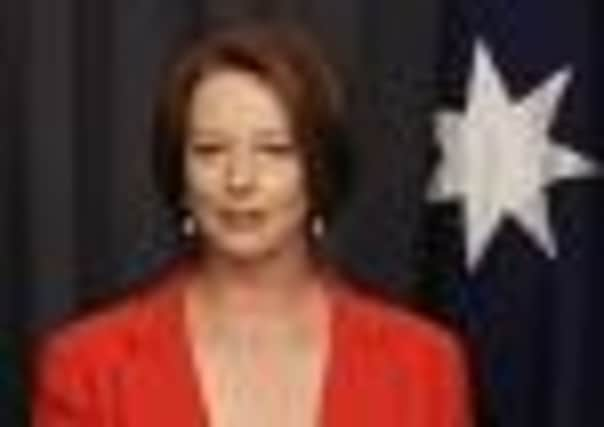Labour’s pains rumble on


Ms Gillard comfortably defeated Kevin Rudd, her former foreign minister, 71 votes to 31 in a ballot of Labour Party MPs, ending Mr Rudd’s attempt to recapture the job Ms Gillard took from him in a party coup in 2010. Though Mr Rudd said he will not challenge Ms Gillard again, his supporters predicted that party power brokers will simply nominate someone else to do so within months.
Welsh-born Ms Gillard described her win as “overwhelming” after months of “ugly” party infighting. She said that if the battling ends and the party is united, Labour could “absolutely win the next election” against the conservative opposition.
Advertisement
Hide AdAdvertisement
Hide AdMr Rudd, who warned that Ms Gillard would lead Labour to certain defeat next year, called on the party to unite behind her.
He said: “I bear no-one any malice and if I’ve done wrong to anyone with what I’ve said and what I’ve done, I apologise.”
He said it was time the “wounds were healed” in the party.
Mr Rudd has never forgiven Ms Gillard since she deposed him as prime minister two years ago. The party had been in turmoil for months with talk that he would challenge Ms Gillard.
Mr Rudd’s resignation as foreign minister before his leadership challenge means Ms Gillard must reshape her Cabinet, and the changes could go well beyond one post. At least five other members of the Cabinet backed Mr Rudd, including resources minister Martin Ferguson and emergency management minister Robert McClelland, who both said their government was doomed at the next elections under Ms Gillard’s leadership.
Ms Gillard yesterday declined to comment on the fate of the ministers who publicly supported Mr Rudd. Meanwhile, after the vote, one of her own supporters, Senator Mark Arbib, said he would quit as sports minister and as a senator.
Mr Arbib, a party power broker who helped orchestrate Ms Gillard’s coup, said he was resigning in the interest of restoring government unity. A rising number of MPs say the coup was a mistake and blame the continuing turmoil on Mr Arbib.
He said: “I’m resigning because I want to give the party a chance to heal. I want to be able to mend some of the conflict that has happened in the past.”
Nick Economou, a Monash University political scientist, said Ms Gillard’s leadership was “terminal”. He said he expects Mr Rudd or someone else will make a second challenge before elections are due next year.
Advertisement
Hide AdAdvertisement
Hide AdAustralian National University political scientist Michael McKinley said Ms Gillard had six months to lift Labour’s and her own standing in the polls – but that Mr Rudd is the only Labour politician who could pose a credible challenge.
However, Martin O’Shannessy, chief executive of the market researcher Newspoll, said he believes Ms Gillard could improve her standing among voters in time for the next election.
He said other governments of other recent prime ministers ended up getting re-elected despite extended periods of high voter dissatisfaction.
“If they think you’re a good manager, they’ll vote for you even if they don’t like you,” Mr O’Shannessy said.
A Newspoll survey published yesterday showed most respondents thought Mr Rudd would make a better prime minister than opposition leader Tony Abbott. Mr Rudd’s support stood at 53 per cent, 34 per cent chose Mr Abbott and 13 per cent were undecided. When given a choice between Ms Gillard and Mr Abbott, Mr Abbott led 38 per cent to 36 per cent.